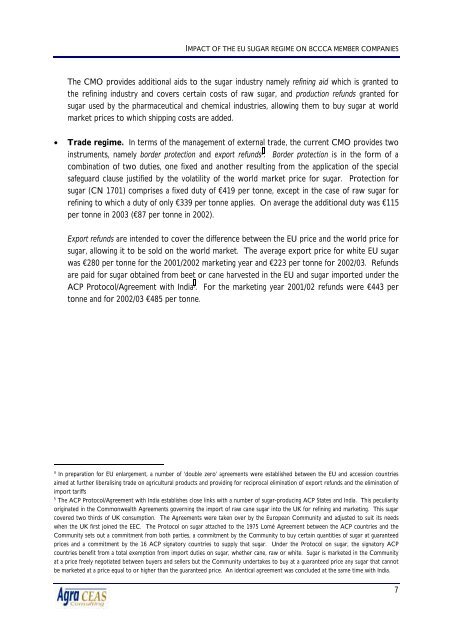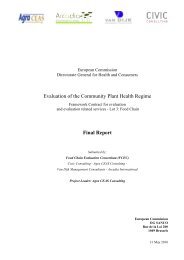2205 final report.pdf - Agra CEAS Consulting
2205 final report.pdf - Agra CEAS Consulting
2205 final report.pdf - Agra CEAS Consulting
Create successful ePaper yourself
Turn your PDF publications into a flip-book with our unique Google optimized e-Paper software.
IMPACT OF THE EU SUGAR REGIME ON BCCCA MEMBER COMPANIES<br />
The CMO provides additional aids to the sugar industry namely refining aid which is granted to<br />
the refining industry and covers certain costs of raw sugar, and production refunds granted for<br />
sugar used by the pharmaceutical and chemical industries, allowing them to buy sugar at world<br />
market prices to which shipping costs are added.<br />
• Trade regime. In terms of the management of external trade, the current CMO provides two<br />
instruments, namely border protection and export refunds 4 . Border protection is in the form of a<br />
combination of two duties, one fixed and another resulting from the application of the special<br />
safeguard clause justified by the volatility of the world market price for sugar. Protection for<br />
sugar (CN 1701) comprises a fixed duty of €419 per tonne, except in the case of raw sugar for<br />
refining to which a duty of only €339 per tonne applies. On average the additional duty was €115<br />
per tonne in 2003 (€87 per tonne in 2002).<br />
Export refunds are intended to cover the difference between the EU price and the world price for<br />
sugar, allowing it to be sold on the world market. The average export price for white EU sugar<br />
was €280 per tonne for the 2001/2002 marketing year and €223 per tonne for 2002/03. Refunds<br />
are paid for sugar obtained from beet or cane harvested in the EU and sugar imported under the<br />
ACP Protocol/Agreement with India 5 . For the marketing year 2001/02 refunds were €443 per<br />
tonne and for 2002/03 €485 per tonne.<br />
4<br />
In preparation for EU enlargement, a number of ‘double zero’ agreements were established between the EU and accession countries<br />
aimed at further liberalising trade on agricultural products and providing for reciprocal elimination of export refunds and the elimination of<br />
import tariffs<br />
5<br />
The ACP Protocol/Agreement with India establishes close links with a number of sugar-producing ACP States and India. This peculiarity<br />
originated in the Commonwealth Agreements governing the import of raw cane sugar into the UK for refining and marketing. This sugar<br />
covered two thirds of UK consumption. The Agreements were taken over by the European Community and adjusted to suit its needs<br />
when the UK first joined the EEC. The Protocol on sugar attached to the 1975 Lomé Agreement between the ACP countries and the<br />
Community sets out a commitment from both parties, a commitment by the Community to buy certain quantities of sugar at guaranteed<br />
prices and a commitment by the 16 ACP signatory countries to supply that sugar. Under the Protocol on sugar, the signatory ACP<br />
countries benefit from a total exemption from import duties on sugar, whether cane, raw or white. Sugar is marketed in the Community<br />
at a price freely negotiated between buyers and sellers but the Community undertakes to buy at a guaranteed price any sugar that cannot<br />
be marketed at a price equal to or higher than the guaranteed price. An identical agreement was concluded at the same time with India.<br />
7













